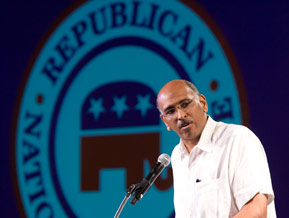RNC Rejects Plan to Hold Candidates Accountable?
The Republican National Committee just rejected a plan that would have required GOP candidates to meet 8 of 10 policy questions in order to receive national support and funding in favor of passing a watered down resolution that only “urges” party leaders to support nominees that back the party’s platform.
This resolution is non-binding and I for one doubt its effectiveness. One major complaint that Republicans have about their party is the lack of accountability when it comes to candidates. Conservatives are tired of voting for R.I.N.O.s that have the support of the establishment. Everyone would like to see our candidates held to the party platform and our conservative principles. The only way to guarantee that we have true conservatives in office is to start holding our candidates accountable. The RNC had a chance to set an example for the rest of the nation by standing up for our principles and saying enough is enough. If the RNC had enough gumption to support this plan, it could have set off a chain reaction in which candidates across the country would either be forced to stand up as conservatives or get out of the way.
Instead, they opted for the watered down version. If our platform represents the principles of this party, and our leadership voted against holding candidates and elected officials to the platform, does this mean that the RNC, the leaders of the Republican Party, only support a watered down version of the platform? So much for promoting conservative principles. When push comes to shove, will the RNC lay down and make the grassroots of the party do all of the work to get this party back on track?
Read the whole story from Politico.com below:
___________________________________________________________________________
POLITICO
Republicans reject ‘purity’ test
by Jonathan Martin
HONOLULU — Republicans averted an ideological showdown here Friday, passing a tepid party resolution in place of a candidate “purity test.”
Rejecting a plan that would have required GOP candidates to meet at least eight of 10 policy questions to receive national support and funding, the Republican National Committee unanimously approved a rule that only “urges” party leaders to support nominees who back the party’s platform.
The author of the original proposal, Indiana National Republican Committeeman James Bopp, agreed to withdraw his resolution in the face of overwhelming opposition and backed the watered-down language.
Yet even after the compromise was reached, tempers flared between Republicans on opposing sides of the issue — vividly illustrating the lingering divide between the party’s conservative activist wing and pragmatic establishment wing.
Talking to reporters in a ballroom following the committee’s general session here, where the RNC is holding its winter meeting, Bopp insisted the replacement resolution still amounted to a win for requiring candidates to toe the conservative line.
“You’ve got to determine that the candidate supports all the core principles of the Republican Party before you support them,” he said, explaining the alternate measure.
But when asked whether it was binding, Bopp was cut off by Oregon GOP Chairman Bob Tiernan, who was standing nearby the impromptu press briefing.
“That resolution passed is not binding; it’s a suggestion,” said Tiernan.
As Bopp began to again make his case for the compromise, Tiernan again interjected.
“There’s nothing mandatory or required in there,” the Oregonian noted.
“Can I answer the question, Mr. Chairman?” Bopp shot back.
Continuing, Bopp explained that he thought the RNC’s decision to, for the first time, make it party policy to urge candidates to pledge fealty to the GOP platform represented a significant step.
But Tiernan, standing just over Bopp’s shoulder, again rebutted his committee colleague.
“I’m not going to take that back and make my candidates sign it, that’s ridiculous,” Tiernan said, gesturing toward the compromise resolution in a reporter’s hand. “We don’t have a litmus test and we rejected the litmus test today.”
As Bopp continued, Tiernan again spoke up.
“There’s nothing binding in there,” said the state chairman.
“Can I finish?” a plainly annoyed Bopp asked.
“Read the words,” replied Tiernan.
“Shut up,” Bopp finally said.
The Oregonian walked away moments later but continued to express incredulity in an interview.
“I cannot believe he’s saying what he’s saying,” Tiernan said, noting that the state chairs unanimously voted on Wednesday to reject Bopp’s resolution, a symbolic move that indicated how little support there was for the binding proposal.
Calling Bopp’s original idea “nuts,” Tiernan said his committee colleague was “trying to save face” by claiming the compromise resolution was as strong as the initial idea to bar financial support from those candidates who didn’t meet 8 of 10 issue tests.
“He got flatly rejected,” Tiernan said, chalking up Bopp’s move to lingering bitterness over the year-old national committee chairman’s contest.
“There’s five or six people [on the committee] that didn’t get their candidate elected back in January and they’re still upset about it and they’re trying to micromanage the process and micromanage the chairman,” he complained.
Senior Republican officials contend that Bopp is in a distinct minority among committee members and that the vote of the state chairs made plain that there was no appetite for imposing a “purity test” on their candidates. RNC Chairman Michael Steele and many of the party’s senior-most elected officials and strategists had expressed their opposition to such a test when it was first proposed late last year. And, indeed, few in the party expected the initial resolution to even come to a vote, much less pass.
Mississippi Republican committeeman and national Resolutions Committee chair Henry Barbour expressed the sentiment of many in the party when he offered an “editorial comment” after he went through the resolutions Friday morning.
“I think we’d all prefer to see more focus on how we’re going to beat the Democrats in November then much of the noise that is coming from resolutions,” said Barbour, not explicitly singling out Bopp.
But even as GOP spirits have been lifted by victories in New Jersey, Virginia and Massachusetts, the results of a special congressional election last November in upstate New York have resurrected age-old conservative concerns about the party straying from its principles.
The GOP nominee in that New York contest, Dede Scozzafava, won national party support but was opposed by a conservative third-party candidate who drew backing from some out-of-state Republicans. Scozzafava dropped out of the race days before the election and threw her support to the Democratic nominee, Bill Owens, who then narrowly won a seat that had been previously held by Republicans since the Civil War.
The agreed-upon resolution, introduced by Texas national committeeman Bill Crocker, alludes to that race without mentioning names, stating that “many Republican leaders and Republican organizations were undermined and lost credibility as a result of the actions of such candidates.”
On that point at least, Bopp and the committee seemed to agree.
“The impetus for all of these has been, from my standpoint, that Chairman Steele felt that he had to support all candidates regardless of ideology,” Bopp said of the resolutions. “And as a result, we suffered almost a disgrace as a result of supporting Dede in N.Y.-23.”
__________________________________________________________________________


Comments are closed.